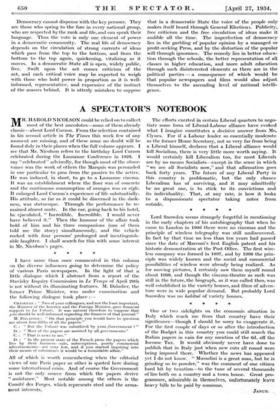I have more than once commented in this column on
the diverse influences going to determine the policy of various Paris newspapers. In the light of that a little dialogue which I abstract from a report of the Stavisky Inquiry Commission in Le Temps of April 20th is not without its illuminating features. M. Daladier, the former Prime Minister, was under examination and the following dialogue took place :— CHAIRMAN : " Two of your colleagues, and not the least important, the Minister of the Interior and the Foreign Minister, gave financial support to La Volonte. It was natural therefore to suppose that you should be well-informed regarding thi3 finances of that journal."
M. DALADIER : " On that principle you would have to question
:no about four-fifths of all the papers." .
C.: " But the Volonte was subsidized by your,,Goveriunent ? "
D.: " Most of the papers are assisted by all governments."
C.: " That is news to me."
D.: " In the present state of the French press the papers which live by their business—sale, subscriptions, purely commercial advertisements—are very few, and if you started inquiring into their means of subsistence it would be a formidable affair."
All of which is worth remembering when the editorial views of one Paris paper or other is quoted here during some international crisis. And of course the Government is not the only source from which the papers derive " assistance." Most notable among the others is the Comite des Forges, which represents steel and. the arma- ment interests. The efforts exerted in certain Liberal quarters to nego- tiate some form of Liberal-Labour affiance have evoked what I imagine constitutes a decisive answer from Mr. Clynes. For if a Labour leader so essentially moderate as the former Home Secretary, not so very far from being a Liberal himself, declares that a Liberal affiance would kill Socialism, there is very little more worth saying. It would certainly kill Liberalism too, for most Liberals are by no means Socialists—except in the sense in which "we are all Socialists now," and that affirmation goes back forty years. The future of any Liberal Party in this country is problematic, but the only chance Liberalism has of surviving, and it may admittedly be no great one, is to stick to its convictions and its individuality. That, at any rate, is how it looks to a dispassionate spectator taking notes from outside.
* *












































 Previous page
Previous page